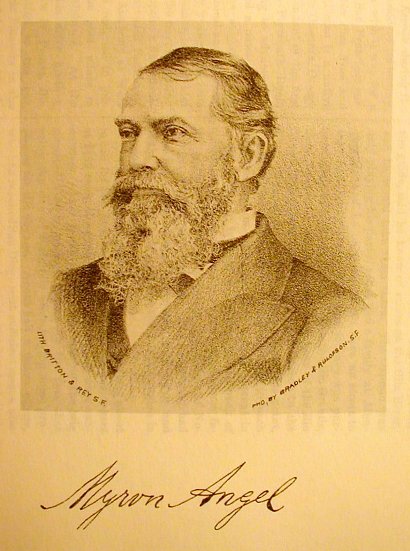
MYRON ANGEL AND MAJOR ORMSBY

|
Myron and Eugene were first cousins of David Fairchild's children. It was, on the Fairchild side, as their mother was Eunice Fairchild, the sister of David Fairchild. Myron Angel grew up in Oneonta, in Upstate New York. Myron W. Angel of Milford, New York, was admitted to the U.S. Military Academy on July 1, 1846, at the age of eighteen years, seven months. At the examinations held in June 1848, Angel was found deficient in both mathematics and French. He resigned from the Academy effective June 30, 1848. That info came from Suzanne Christoff, Associate Director for Special Collections and Archives, USMA Library. Leaving West Point at the urging of his brother, Eugene, to go west and search for gold. The lure of gold led the two to California. They had many misadventures as they crossed the continent. In one case they became separated from their trunks. When the wagon train carrying them had to lighten the load, Myron's trunk of books and clothes was jettisoned in the sand. An Army officer came upon it and finding the West Point markings, had it shipped west via military wagons. They may have been influenced by their Uncle, David Fairchild, and their first cousins in making the decision to move. The brothers arrived in San Diego in 1849 and traveled up the coast to San Francisco. Attempting to find food and shelter, they despaired of finding a job. When an offer was finally made to Myron, a job to shingle the roof of a house, he had to turn down the opportunity because, "I never drove a nail in my life." This experience made an impression on him that would lead to future support for training in the practical aspects of life; that is, the need for vocational education. The trunk of books caught up with them and the sale of those books was instrumental in feeding the two through the winter. Eugene was a business partner with Mahlon D. Fairchild in a number of investments. He was an attorney as well as a surveyor. The brothers crossed the mountains into the Utah and Nevada territories, and had many adventures there. The outcome of one such adventure was fatal to Eugene. THE OVID BEE - September 26, 1860 CALIFORNIA.-- Rumor was rife here some two or more months ago that a brother of ours, (Mahlon) and a cousin, Eugene Angel, had been either captured or massacred by the Indians, in California, sometime in May last. We have been in painful suspense ever since, until a day or two ago, the following letter, written by a brother of Mr. Angel to his sister in Otsego county, arrived here, confirming the rumor in regard to the probable fate of our cousin -- and escape of our brother:
Pilot Hill, El Dorado Co.,
California, June 8, 1860
Dear Sister:
My letters have usually been of a sad and sorrowful nature, in giving a faithful account of the hardships and misfortunes that have attended Eugene and myself, but never has it fallen to my lot before to write a letter bearing so sad news as this.
I lately sent you a paper containing an account of a battle with the Indians near Pyramid Lake, in Utah Territory. Our dear
brother Eugene was in the battle. You will see by the paper that nearly all the command retreated leaving a few brave and
good men to the mercy of the Savages. A gentleman -- Maj. Ormsby was Captain of the company from Carson City, and Eugene
was Lieutenant, Eugene, Maj O. and another person whose name has escaped my memory, were the last on the field. Maj. O.
died a few miles from the battle ground, and the other escaped and reports that he saw Eugene's horse running among the
Indians without a rider. No one saw him fall, but his long absence forbids all hope. I did not learn of his being in the
battle until two weeks after it, as his name was not reported in the papers, and Mahlon did not inform me of it, as he was
endeavoring to raise a party to go in search of him and others, owing to the want of arms and the panic that existed he did
not succeed. I expect to see Mahlon in a day or two and shall go over the mountain as soon as I can.
This letter recalls the May 12, 1860, Paiute War, or Pyramid Lake War, at Big Bend in the Truckee River Valley in Nevada.
Paiutes under Numaga ambushed a party of Nevada volunteers being led by Major William Ormsby. This series of conflicts was caused by the kidnapping of two young Indian women by three white men who held them at their cabin. The men were subsequently killed by a band of rescuing Indians.
There was no mail service for a few weeks after Ormsby was defeated in this battle. The general Indian uprising at this time lead to attacks that resulted in the loss of many Pony Express riders along with their horses, not to mention the destruction of every rest station between California and Salt Lake.
Myron considered his brother a hero of the event and a more detailed story can be found in The History of Nevada, edited by Myron in 1881. |